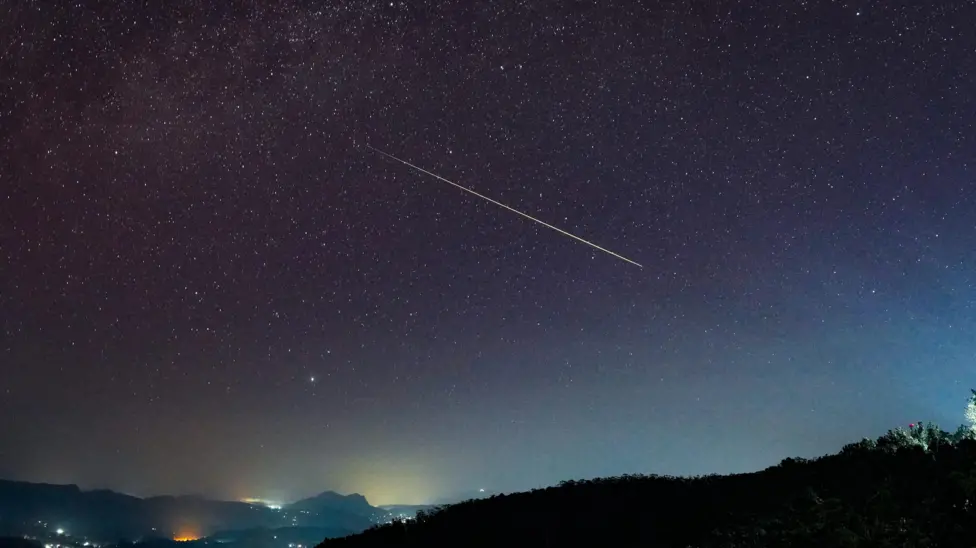Re: SCIENCE And Related Scientific Subjects
Posted: Sat Aug 09, 2025 3:37 pm
Source BBC:
The BBC World Service has launched a special podcast series to mark the 50th anniversary of the Apollo 11 Moon landing.
Actually it's 56years! But who's counting!
"13 Minutes to the Moon" details the final phase of the descent to the lunar surface - and the months and years that led up to those extraordinary moments.
On BBC Sounds: https://www.bbc.co.uk/sounds/brand/m002cbks
On BBC World Service Website: https://www.bbc.co.uk/news/science-environment-48232627
This is well worth seeing/reading etc
I remember watching this with my Parents & Siblings, also three other families in our Street who didn't have a TV, we were all packed into the front room, all the adults smoking, the men drinking bottles of beer, the women glasses of sherry (I think). My Mum and the other Mothers had made plates loads of sandwiches etc, all the kids had Corona Pop! It was a HUGE event. We watched it on one of those old wooden box like (rented Reddifusion) Black & White Televisions. s
It was a HUGE event. We watched it on one of those old wooden box like (rented Reddifusion) Black & White Televisions. s
I can recall (vaguely) when they landed then actually took the First Step outside onto the Moons surface, all the adults raining their bottles and glasses to toast it, but my Grandmother saying "it isn't natural, no good will come of all this 'meddling in space', they need to stop all the wars before they spend all this money on space travel"... what a wise, wise woman! :Bless You Gran!"
Ironically there were Huge Thunder & Lightning Storms all over the UK whilst it was actually happening (*), a Hot, Humid Night with Lightning lighting up the nights sky...and downpours of rain!
(*) The next day we discovered that the oldest tree (Oak) in the local park, right by one end of the 2 Football Pitches had been struck during that evening's Thunder & Lightning storm, it was nearly split in two, all blackened and it smelt of burning (Perhaps a 'sign' or 'omen'? ... well that's what some of the oldies (pensioners) were saying...
Apollo 11 Mission:
16 Jul 1969 – 24 Jul 1969
The exact date of the first moon landing July 20, 1969
The Apollo 11 lunar module landed on the Moon at 8:17 PM UK time (BST) on July 20, 1969.
Apollo 11
Apollo 11 was a spaceflight conducted from July 16 to 24, 1969, by the United States and launched by NASA. It marked the first time that humans landed on the Moon. Wikipedia
Dates: 16 Jul 1969 – 24 Jul 1969
Aposelene altitude: 122.4 kilometers (66.1 nmi)
Crew size: 3
Inclination: 1.25 degrees
Launch mass: 109,646 pounds (49,735 kg)
Mission duration: 8 days, 3 hours, 18 minutes, 35 seconds
Sample mass: 21.55 kilograms (47.51 lb)
It seems more like 100's of years ago, nor just 56 Years!
The BBC World Service has launched a special podcast series to mark the 50th anniversary of the Apollo 11 Moon landing.
Actually it's 56years! But who's counting!
"13 Minutes to the Moon" details the final phase of the descent to the lunar surface - and the months and years that led up to those extraordinary moments.
On BBC Sounds: https://www.bbc.co.uk/sounds/brand/m002cbks
On BBC World Service Website: https://www.bbc.co.uk/news/science-environment-48232627
This is well worth seeing/reading etc
I remember watching this with my Parents & Siblings, also three other families in our Street who didn't have a TV, we were all packed into the front room, all the adults smoking, the men drinking bottles of beer, the women glasses of sherry (I think). My Mum and the other Mothers had made plates loads of sandwiches etc, all the kids had Corona Pop!
I can recall (vaguely) when they landed then actually took the First Step outside onto the Moons surface, all the adults raining their bottles and glasses to toast it, but my Grandmother saying "it isn't natural, no good will come of all this 'meddling in space', they need to stop all the wars before they spend all this money on space travel"... what a wise, wise woman! :Bless You Gran!"
Ironically there were Huge Thunder & Lightning Storms all over the UK whilst it was actually happening (*), a Hot, Humid Night with Lightning lighting up the nights sky...and downpours of rain!
(*) The next day we discovered that the oldest tree (Oak) in the local park, right by one end of the 2 Football Pitches had been struck during that evening's Thunder & Lightning storm, it was nearly split in two, all blackened and it smelt of burning (Perhaps a 'sign' or 'omen'? ... well that's what some of the oldies (pensioners) were saying...
Apollo 11 Mission:
16 Jul 1969 – 24 Jul 1969
The exact date of the first moon landing July 20, 1969
The Apollo 11 lunar module landed on the Moon at 8:17 PM UK time (BST) on July 20, 1969.
Apollo 11
Apollo 11 was a spaceflight conducted from July 16 to 24, 1969, by the United States and launched by NASA. It marked the first time that humans landed on the Moon. Wikipedia
Dates: 16 Jul 1969 – 24 Jul 1969
Aposelene altitude: 122.4 kilometers (66.1 nmi)
Crew size: 3
Inclination: 1.25 degrees
Launch mass: 109,646 pounds (49,735 kg)
Mission duration: 8 days, 3 hours, 18 minutes, 35 seconds
Sample mass: 21.55 kilograms (47.51 lb)
It seems more like 100's of years ago, nor just 56 Years!
